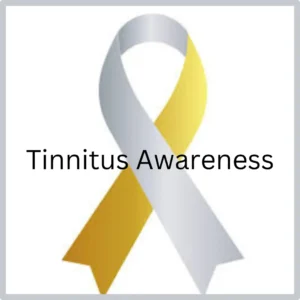It’s Tinnitus Awareness Week 2025!
 Tinnitus Awareness Week 2025 runs from February 3 to February 9, raising awareness about this often-misunderstood condition. Tinnitus, the perception of sound without an external source, affects millions worldwide. By learning more about it, you can take steps to manage it effectively. Managing tinnitus and hearing loss is crucial for overall health, as untreated issues can lead to social isolation, cognitive decline, and reduced quality of life.
Tinnitus Awareness Week 2025 runs from February 3 to February 9, raising awareness about this often-misunderstood condition. Tinnitus, the perception of sound without an external source, affects millions worldwide. By learning more about it, you can take steps to manage it effectively. Managing tinnitus and hearing loss is crucial for overall health, as untreated issues can lead to social isolation, cognitive decline, and reduced quality of life.

What is Tinnitus Awareness Week?
This annual event highlights tinnitus’ impact and promotes strategies for support and management. Organizations and hearing care providers collaborate to:
- Educate the public about tinnitus.
- Support those living with tinnitus.
- Break stigmas surrounding the condition.
- Encourage people to seek help.
Understanding tinnitus helps people feel less alone and more empowered to find solutions.
Why is Tinnitus Awareness Important?
Limited Research
Despite its prevalence, tinnitus remains under-researched. Increased funding can advance treatments, including surgical implants, innovative therapies, and personalized care plans. Without robust research, promising solutions may remain underdeveloped, leaving many to struggle without effective management tools.
Stigma Reduction
Many hesitate to discuss tinnitus due to embarrassment or fear of being dismissed. This stigma can prevent individuals from seeking professional advice and support. Normalizing conversations about tinnitus encourages earlier diagnosis, better management, and improved quality of life. Open discussions can also foster empathy and understanding among family, friends, and coworkers.
Widespread Impact
Tinnitus affects about 10% of adults, yet it often goes undiagnosed and untreated. The condition is more than just an annoyance; it can disrupt sleep, concentration, and emotional well-being. By raising awareness, we ensure that more people recognize the symptoms and seek care promptly, reducing the risk of associated complications like anxiety, depression, and cognitive decline.
Importance for Overall Health
Addressing tinnitus and hearing loss is critical for overall health. Untreated hearing issues can strain social relationships, hinder professional growth, and contribute to feelings of isolation. Research links untreated hearing loss and tinnitus to cognitive decline, emphasizing the need for timely intervention. By managing these conditions, individuals can maintain their independence, mental sharpness, and emotional well-being.
Discover how addressing hearing loss improves overall healthcare.
Common Causes of Tinnitus
Understanding what triggers tinnitus can help manage its effects. So, here are the common causes:
Hearing Loss
- Age-related changes in the auditory system can cause hearing loss and tinnitus. Over time, the brain may attempt to compensate for missing auditory signals, leading to the perception of phantom sounds.
- Noise-induced hearing loss from prolonged exposure to loud environments is another significant factor. Concerts, construction sites, and even headphones played at high volumes can damage the delicate structures of the inner ear.
Learn more about the symptoms of hidden hearing loss.
Stress and Anxiety
- Stress can exacerbate tinnitus symptoms by heightening the brain’s sensitivity to sound.
- Anxiety may create a feedback loop, where worrying about tinnitus intensifies its perception.
Loud Noise Exposure
- Sudden, intense sounds like explosions or prolonged exposure to loud machinery can harm the inner ear.
- Preventive measures, such as wearing ear protection, can reduce the risk of damage.
Medical Conditions
- Ear Infections and Blockages: Conditions like ear infections, fluid buildup, or excessive earwax can cause temporary tinnitus. Treating these issues can often resolve the symptoms.
- Jaw Joint Problems: Disorders of the temporomandibular joint (TMJ) can contribute to tinnitus due to its proximity to the ear.
- Chronic Illnesses: Conditions such as diabetes, thyroid disorders, and migraines are linked to tinnitus. Proper management of these illnesses may alleviate symptoms.
Find out about one common type of ear infection, swimmer’s ear.
Head and Neck Injuries
- Trauma to the head or neck can damage auditory pathways, leading to tinnitus. These injuries should be promptly evaluated by a medical professional.
Medications
- Some medications, including non-steroidal anti-inflammatory drugs (NSAIDs), certain antibiotics, and antidepressants, list tinnitus as a potential side effect. But, always consult a healthcare provider before discontinuing any medication.
How Can You Manage Tinnitus?
Managing tinnitus requires a combination of strategies tailored to individual needs. So, here are effective approaches:
Sound Therapy
- Use white noise machines or hearing aids to mask tinnitus.
- Smartphone apps provide customizable soundscapes to create a calming environment.
Behavioral Therapy
- Cognitive Behavioral Therapy (CBT) helps change your response to tinnitus.
- Tinnitus Retraining Therapy (TRT) retrains your brain to ignore tinnitus sounds over time.
Lifestyle Changes
- Reduce caffeine and alcohol consumption to minimize symptoms.
- Practice relaxation techniques like yoga or meditation to lower stress levels.
Professional Support
- Consult a hearing care provider for tailored solutions.
- Regular check-ups ensure optimal management and prevent potential problems.
How You Can Participate in Tinnitus Awareness Week
You can make a difference by spreading knowledge and supporting initiatives. Here are ways to get involved:
- Educate Yourself
- Learn about tinnitus to help others understand it better.
- Share Information
- Use social media to share facts and resources.
- Encourage Support
- Motivate friends or family members with tinnitus to seek professional help.
Seeking Help for Tinnitus
So, if you or someone you know experiences tinnitus, don’t hesitate to seek assistance. We offer compassionate care. Contact Stanford Hearing today to schedule an evaluation and start your journey to better hearing health!

